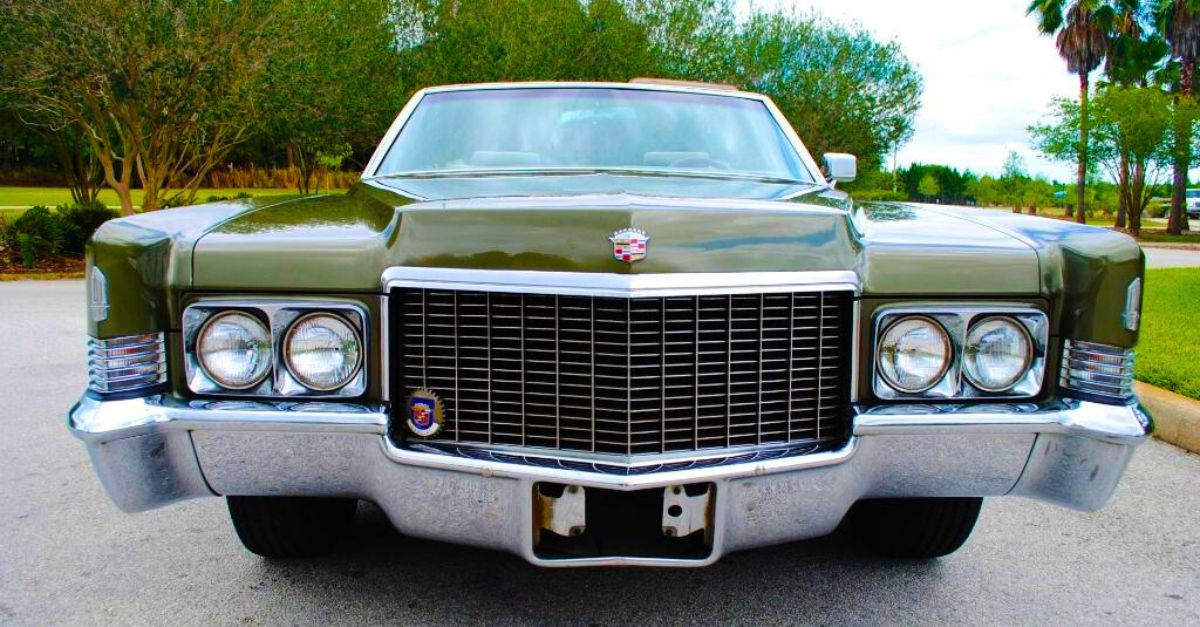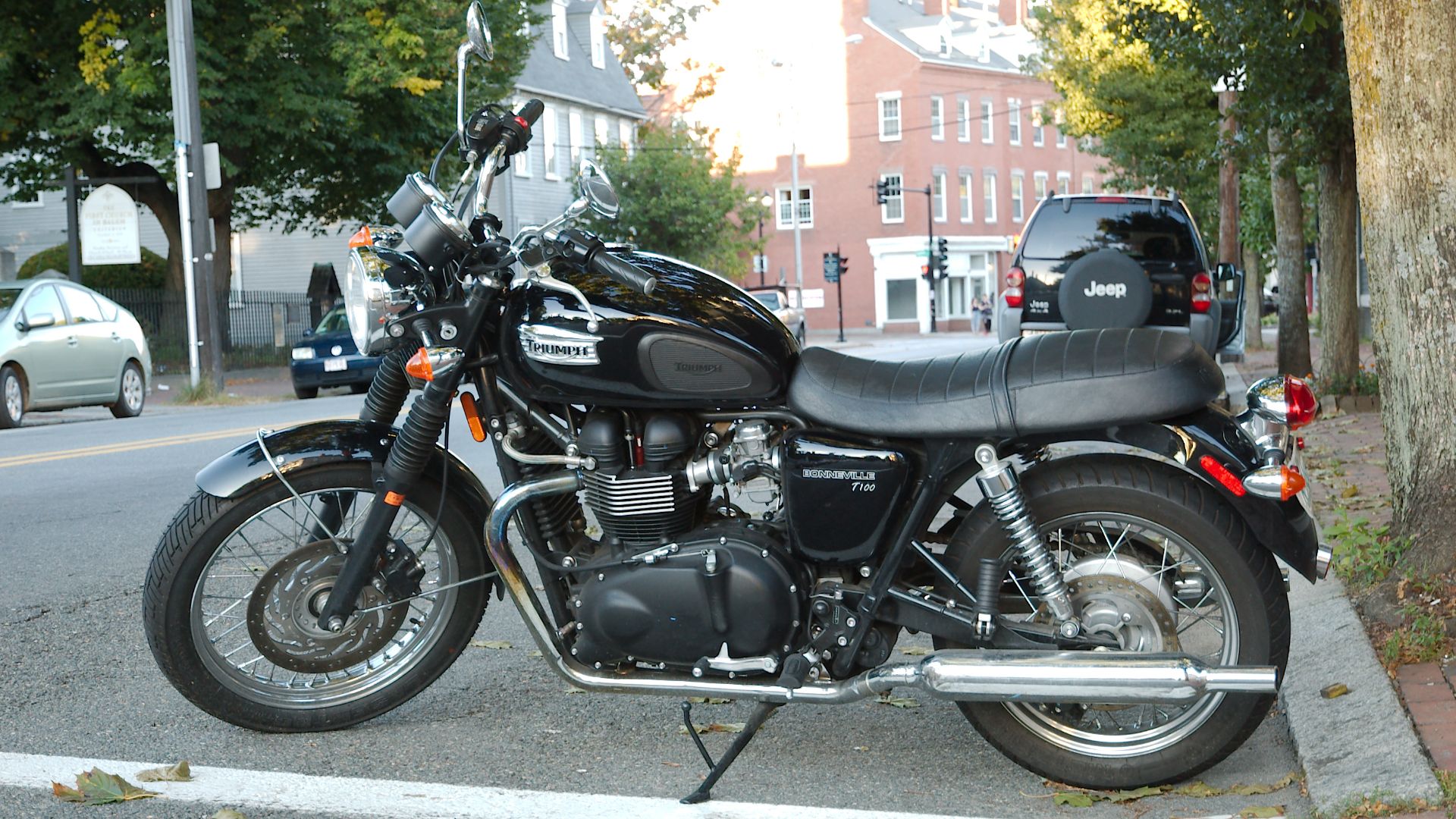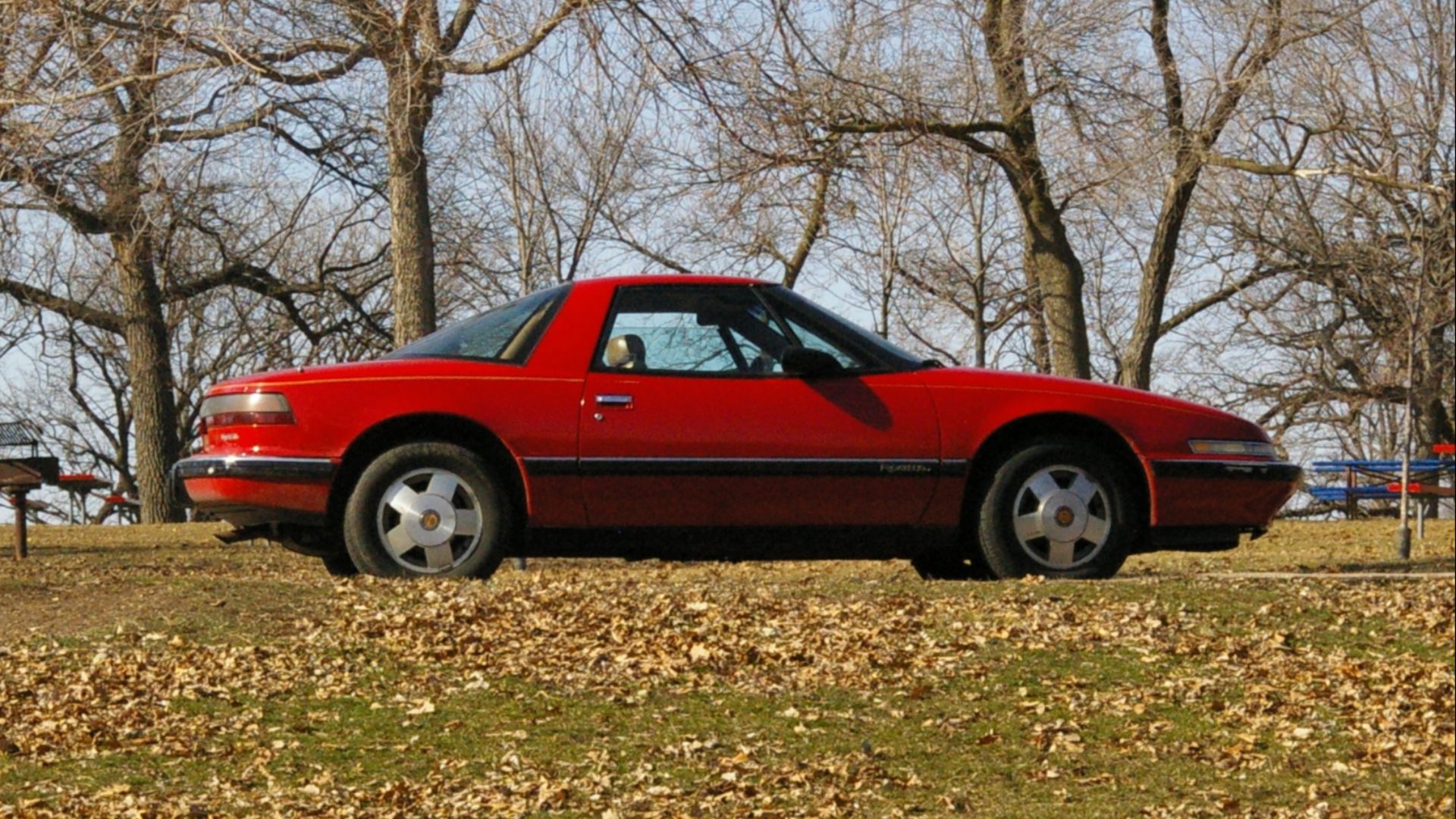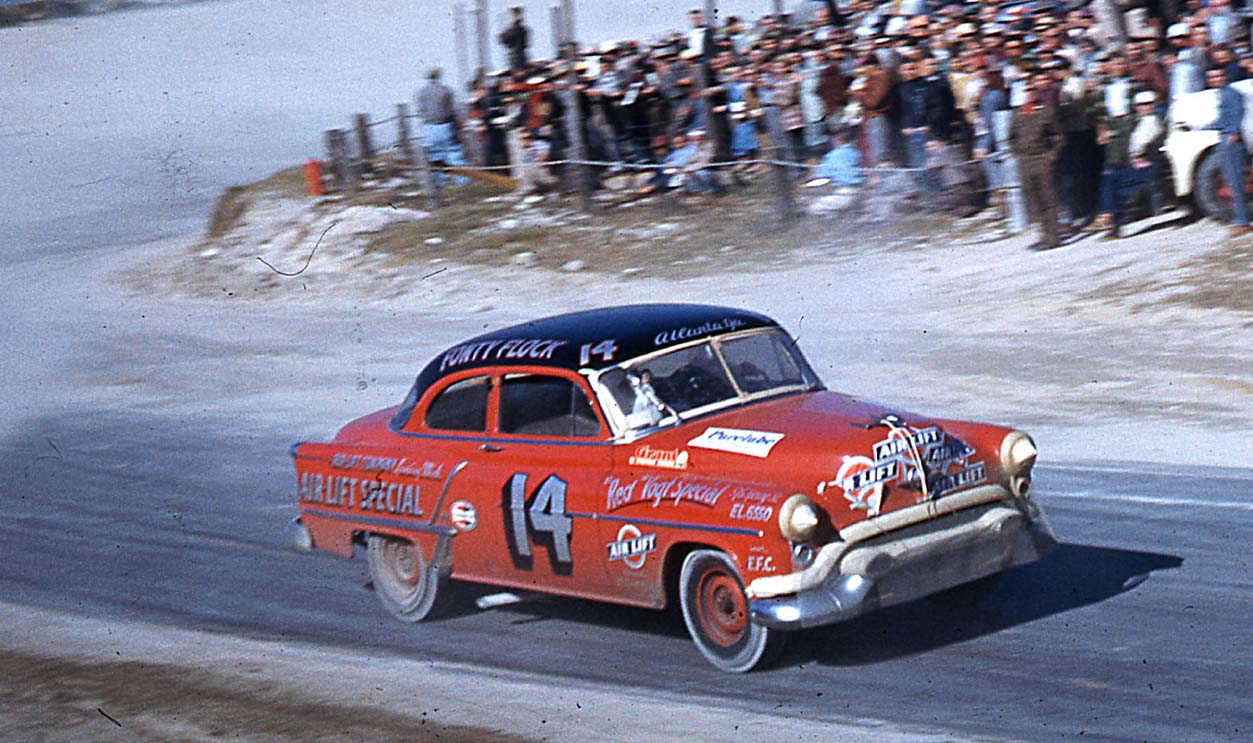Beloved By Celebs
Trivia time: what do Adam Sandler, Marilyn Monroe, Clark Gable, Elvis Presley, Clint Eastwood, and Rita Hayworth have in common? They all loved their Cadillacs. What made them fall in love with the brand that rewrote the standards of the industry?
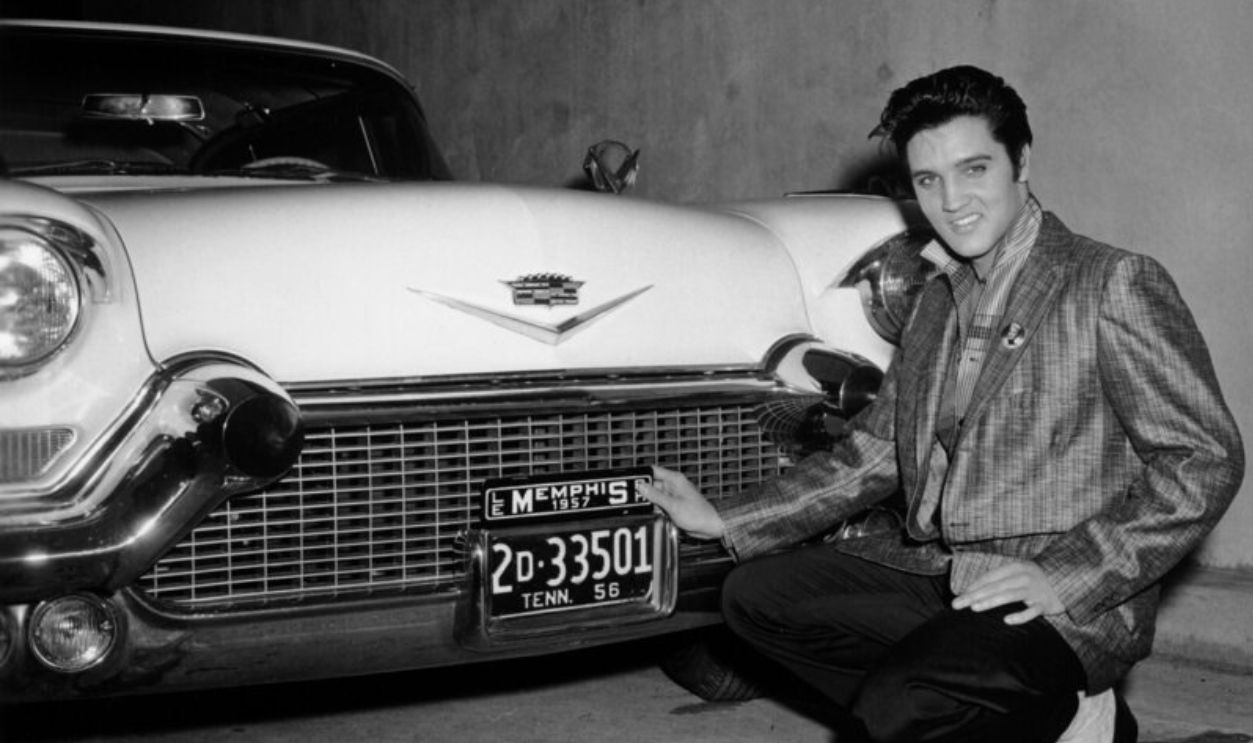
Precision Engineering And Stylish Luxury Finishes
Cadillac is a brand designed for individuals who demand and seek an experience that combines luxury and innovation. This iconic American marque caters to a diverse audience, from the successful professional to those with a penchant for high-end craftsmanship.
 Jeremy, CC BY 2.0, Wikimedia Commons
Jeremy, CC BY 2.0, Wikimedia Commons
This Is Why Cadillac Stands Out
What truly sets Cadillac apart is its relentless pursuit of luxury and performance. From the pioneering introduction of the V8 engine to its advanced technologies like Super Cruise, Cadillac has always been at the forefront of automotive progress. So, how did it all start?
 JOHN LLOYD, CC BY 2.0, Wikimedia Commons
JOHN LLOYD, CC BY 2.0, Wikimedia Commons
It Began With A Collaboration
In 1902, Henry Ford left his company. His financial backers, William Murphy and Lemuel Bowen, agreed with Henry M. Leland to produce his vehicles with Ford's help. Cadillac was named after Antoine Laumet de La Mothe, sieur de Cadillac, who founded Detroit.
 Unknown Author, Wikimedia Commons
Unknown Author, Wikimedia Commons
The First Cadillac
During the same year, the first Cadillac was born. This was a horseless 2-seater with a single engine that offered 10hp, which was a copy of Ford's Model A. In 1904, Model B was refined with an extended front and the addition of a transverse front suspension.
 Iwao, CC BY 2.0, Wikimedia Commons
Iwao, CC BY 2.0, Wikimedia Commons
It Was A Huge Success
Cadillac displayed its new vehicle at the New York Auto Show in 1903. Visitors were impressed with the precision manufacturing compared to competitors and placed about 2,000 orders. Cadillac Motor Company was established in 1905 after the merger of Cadillac Automobile Company and Leland & Faulconer Manufacturing.
The First 4-Cylinder Production
Later that year, Cadillac introduced Model D, the company's first 4-cylinder car. Its L-head design engine could produce 30 hp and it featured one of the earliest versions of cruise control. This car cost about $2,800 in 1905, which made it one of the most expensive automobiles.
 Internet Archive, Wikimedia Commons
Internet Archive, Wikimedia Commons
General Motors Became Interested
After an outstanding success, General Motors purchased Cadillac, which became GMC's prestige division. GMC could use the Cadillac line for the production of funeral home cars, ambulances, and limos, with the introduction of the first electric system that powers ignition and lighting.
 William Creswell, CC BY 2.0, Wikimedia Commons
William Creswell, CC BY 2.0, Wikimedia Commons
The V8 Engine Revolution
In 1915, Cadillac shocked the automotive world by introducing the V8 engine. For the first time, a production car was equipped with a V8 engine that was affordable and reliable. With this engine, Cadillac set the standard for power and durability in its cars.
 Walte, CC BY 2.0, Wikimedia Commons
Walte, CC BY 2.0, Wikimedia Commons
And Cars Kept Improving
After the success of the initial Type 51, Cadillac kept introducing better and newer models throughout the 1920s. These included Types 53, 57, 59, and 61. But that's not all. These were also the first left-hand drive Cadillacs, although right-hand drives were also available as an option.
 Walter, CC BY 2.0, Wikimedia Commons
Walter, CC BY 2.0, Wikimedia Commons
They Paved The Way In The Luxury Car Market
With the roaring twenties bringing an era of wealth and excess, Cadillac rose to meet the demands of society's elite. Iconic models like the Cadillac 314 featured advanced features such as electric starters and plush interiors that catered to the rich and influential.
 Lars-Göran, CC BY-SA 3.0, Wikimedia Commons
Lars-Göran, CC BY-SA 3.0, Wikimedia Commons
V-16 Cars Were The Hype
Series 452-A was launched from 1930 to 1940 with the improved and limited-version V-16 options. Only a little above 4,000 units were built and most of them in the debut year before the Great Depression took over. And then, WWII affected the sales and the car was discontinued.
 Sicnag, CC BY 2.0, Wikimedia Commons
Sicnag, CC BY 2.0, Wikimedia Commons
The 1930s Were Big
Throughout the 1930s, Cadillac produced a variety of cars powered by multiple engines. This ensured the company could cater to the needs of everyone in the market. Old photos show celebrities of the era, like Marlene Dietrich, posing beside their beloved Cadillacs.
 Sicnag, CC BY 2.0, Wikimedia Commons
Sicnag, CC BY 2.0, Wikimedia Commons
The Army Was Interested Too
Cadillac's vehicles were built to be durable and strong. As a result, the Type 55 Touring Model was chosen by the US Army to support the troops in WWII. More cars were produced with V8, V12, and V16 engines with a few adjustments here and there.
 1917 Cadillac Type 55 Club Roadster by nismogropo
1917 Cadillac Type 55 Club Roadster by nismogropo
LaSalle Was Born
Automobile stylist Harley Earl collaborated with Cadillac to produce LaSalle. This was a companion marque car that offered similar luxury features but at a lower price. GMC had a strategy to fill in the price gaps in the market by offering other brands under its name.
 MercurySable99, CC BY-SA 4.0, Wikimedia Commons
MercurySable99, CC BY-SA 4.0, Wikimedia Commons
And The First Turret Top Was Introduced
By this time, passenger cars had roofs made of fabric-covered wood. However, Cadillac took the initiative by introducing the first steel or turret roof to make cars more durable. Nevertheless, sales suffered massively due to the Great Depression, and the company struggled.
 Theodulf, CC BY-SA 3.0, Wikimedia Commons
Theodulf, CC BY-SA 3.0, Wikimedia Commons
Recovery Was On The Way
After the sales declined by 84% during the Great Depression, Cadillac was able to recover by introducing its Series 60—the brand's entry into the mid-priced market. Its new and more affordable Monobloc V8 engine helped the car become Cadillac's best seller in 1936.
 AlfvanBeem, CC0, Wikimedia Commons
AlfvanBeem, CC0, Wikimedia Commons
But An Improvement Was Due
Although this model inspired the Sixty Special, which stayed in production till 1993, Series 60 was replaced by Series 61. It was available as a sedan with a central divider, club coupe, or convertible. Series 62 and Series 63 were later produced to compensate for the suspension of the LaSalle.
 Brian Snelson, CC BY 2.0, Wikimedia Commons
Brian Snelson, CC BY 2.0, Wikimedia Commons
Cadillac Became The Choice Of Royals And Celebrities
Many royals chose the 1930 custom town car as their vehicle of choice. These included The Shah of Persia and even The Duke of Bedford. Hollywood stars also loved this luxurious car. Jean Harlow, the star of Red Dust, has a famous photo beside her Cadillac V-12 vehicle.
 Katherine Tompkins, CC BY 2.0, Wikimedia Commons
Katherine Tompkins, CC BY 2.0, Wikimedia Commons
It Was Exclusive
With only a total of 10,903 units produced, this was and still is one of the rarest Cadillacs. It was the only standard production V-12 vehicle and it represented the second in luxury line after the V-16 models. However, it was difficult telling them apart.
 Rex Gray, CC BY 2.0, Wikimedia Commons
Rex Gray, CC BY 2.0, Wikimedia Commons
And The Automatic Transmission Hit The Markets
In the 1940s, Cadillac took another bold step forward by introducing the first fully automatic transmission in a production car—the Hydra-Matic. This groundbreaking development forever changed the way cars were driven by making smooth, effortless shifts a reality for everyday drivers.
 Daderot, CC0, Wikimedia Commons
Daderot, CC0, Wikimedia Commons
A Symbol Of Postwar Luxury
When the Cadillac Eldorado debuted in 1953, it redefined the concept of luxury and became an instant icon. The Eldorado was a statement of wealth, sophistication, and technological advancement. With its bold tailfins and groundbreaking features like air conditioning, the Eldorado was a dream car for many.
 SG2012, CC BY 2.0, Wikimedia Commons
SG2012, CC BY 2.0, Wikimedia Commons
It Was A Special Edition
The Eldorado was a limited edition package of the Cadillac Series 62, just like the Cadillac Coupe de Ville. It was also available only as a convertible. Nevertheless, thanks to the success of these two models, Cadillac decided to mass-produce them.
 Lars-Göran, CC BY-SA 3.0, Wikimedia Commons
Lars-Göran, CC BY-SA 3.0, Wikimedia Commons
The Evolution Of The Iconic Tailfins
Cadillac's tailfins are perhaps one of the most recognizable features in automotive history. Introduced in 1948 on the Cadillac Series 62, these dramatic fins immediately caught the eye of the public and became a symbol of the brand's bold design philosophy.
 Morven, CC BY-SA 3.0, Wikimedia Commons
Morven, CC BY-SA 3.0, Wikimedia Commons
Everyone Could Have Their Own Aircraft On The Ground
Inspired by aircraft design, the tailfins quickly became a hallmark of postwar automotive design, with Cadillac leading the way. By the 1950s, they had grown to enormous proportions to make the company’s cars a symbol of forward-thinking design. Eventually, they would be retired due to changes in preferences.
 Joe Ross, CC BY-SA 2.0, Wikimedia Commons
Joe Ross, CC BY-SA 2.0, Wikimedia Commons
Cadillac's Quest For Technological Superiority
As the 1960s dawned, Cadillac was a symbol of American prosperity and sophistication. The company pushed the envelope with innovative features like air-conditioning and plush leather interiors that set its vehicles apart from all others. With models like the Cadillac Calais, the brand became synonymous with luxury.
 That Hartford Guy, CC BY-SA 2.0, Wikimedia Commons
That Hartford Guy, CC BY-SA 2.0, Wikimedia Commons
And The Cars Kept Getting Bigger
Just like the 1950s, Cadillac's 1960s models kept getting bigger and better. For example, the wheelbase of the Series 75 increased from 131 inches in the 1930s to 149.8 inches. The Calais was available as a 2 or 4-hardtop model or a 4-door Sedan, and it came with power steering.
 Greg Gjerdingen, CC BY-SA 2.0, Wikimedia Commons
Greg Gjerdingen, CC BY-SA 2.0, Wikimedia Commons
The Ultimate Driving Experience
By the late 1960s, Cadillac was offering an excellent driving experience that focused on improving performance and comfort. As a result, it sold 200,000 cars for the first time in 1968. The introduction of new safety features made cars more fun to drive.
 That Hartford Guy, CC BY-SA 2.0, Wikimedia Commons
That Hartford Guy, CC BY-SA 2.0, Wikimedia Commons
The Front-Wheel Drive Eldorado Was Back
For the first time, the company released the front-wheel drive Eldorado in 1967. There was a significant change in the design with a departure from the 1950s tailfin. It came with a 7.7 L engine that was later upgraded to give the car more power.
 Sicnag, CC BY 2.0, Wikimedia Commons
Sicnag, CC BY 2.0, Wikimedia Commons
A Decade Of Reinvention
The 1970s marked a difficult period for Cadillac as it faced challenges in a rapidly changing automotive world. Rising fuel prices and stricter emissions regulations made things challenging for most car manufacturers. Moreover, consumer preferences meant that the company had to reconsider some of its more popular designs.
 JOHN LLOYD, CC BY 2.0, Wikimedia Commons
JOHN LLOYD, CC BY 2.0, Wikimedia Commons
It Was Time To Reconsider
While the 1970s were a time of excess, it was also a period of reinvention for Cadillac. Faced with economic and cultural shifts, Cadillac needed to adapt or risk losing its edge. The 1972 Fleetwood was 4 inches longer than the Series 75 Fleetwood, though.
 denizen24, CC BY 2.0, Wikimedia Commons
denizen24, CC BY 2.0, Wikimedia Commons
Cadillac Had To Survive
At a time when many companies were shutting down or shifting their productions, Cadillac introduced models that could offer smoother rides despite the increase in weight and engine sizes. Thanks to models like the DeVille and Eldorado, the company experienced record sales.
 Berthold Werner, Wikimedia Commons
Berthold Werner, Wikimedia Commons
A New Competitor In The Block
In addition to competition from American automakers, Cadillac was also addressing international competition. As a result, it introduced the Seville in 1976 as a premium international-sized offering that departed from the previous bigger-equals-better strategy that most American car makers followed.
 Greg Gjerdingen, CC BY 2.0, Wikimedia Commons
Greg Gjerdingen, CC BY 2.0, Wikimedia Commons
It Was Time For A Downsizing
All car manufacturers were shifting towards smaller and more manageable cars, and GMC wasn't different. Cadillac began to downsize its cars around 1977 without compromising on elegance or power. The downsized DeVille coupes and sedans were introduced for the company's 75th anniversary.
 That Hartford Guy from Hartford, CC BY-SA 2.0, Wikimedia Commons
That Hartford Guy from Hartford, CC BY-SA 2.0, Wikimedia Commons
Fender Skirts Were Gone
A reduction in weight was needed to contribute to fuel efficiency, so the DeVilles came without the fender skirts that previously covered the rear wheels. Moreover, the 500 in3 V8 inches were replaced with smaller 425 in3 V8 versions to make the cars lighter.
 Sicnag, CC BY 2.0, Wikimedia Commons
Sicnag, CC BY 2.0, Wikimedia Commons
Downsizing Continued Into The 1980s
Thanks to the passage of the Corporate Average Fuel Economy regulations, Cadillac knew that downsizing its cars was the only way to go. Nevertheless, cars like the DeVille were still able to achieve an all-time sales record of 234,171 units with its coupe and sedan versions.
 That Hartford Guy, CC BY-SA 2.0, Wikimedia Commons
That Hartford Guy, CC BY-SA 2.0, Wikimedia Commons
But Cars Never Lost Their Shine
Despite a reduction in size, Cadillac never lost its status as a luxury brand. Moreover, models like the Cimarron were hitting the market to make sure that it's not lost to the smaller and more efficient European vehicles. However, this car wasn't very successful and was discontinued in 1988.
 Greg Gjerdingen, CC BY 2.0, Wikimedia Commons
Greg Gjerdingen, CC BY 2.0, Wikimedia Commons
The Era Of Luxury SUVs With The Escalade
The 1990s saw Cadillac entering a new chapter of its history with the introduction of the Cadillac Escalade. This full-size luxury SUV was a game-changer, offering Cadillac's trademark luxury features in a rugged, go-anywhere package. The Escalade helped Cadillac tap into a new market that demanded opulence and utility.
New Technologies Were Available
Some of the 1990s cars featured new technologies that dazzled car buyers like the integrated message center which provided essential information about speed and temperature, side airbags, and remote controls. Moreover, the TheftLock coded anti-theft technology was an instant hit among drivers.
 That Hartford Guy from Hartford, CC BY-SA 2.0, Wikimedia Commons
That Hartford Guy from Hartford, CC BY-SA 2.0, Wikimedia Commons
Sometimes, It Was A Miss
On the other hand, new offerings weren't that popular. For example, the Catera was introduced as a rebadged Opel Omega B. But with only 95,000 units sold in five years, it had to be retired. Sales of other models, however, weren't that bad.
 MercurySable99, CC BY-SA 4.0, Wikimedia Commons
MercurySable99, CC BY-SA 4.0, Wikimedia Commons
The Art And Science Era
In the 2000s, Cadillac redefined its philosophy by introducing the Art and Science design language. Designs were sharper and more elegant, offered with the latest automotive technological features. Several lineups like the CTS with its V trim, STS, DTS, and the BTS, which wasn't sold in the US, were available.
A Crossover Success Story
The Cadillac SRX marked the brand's entry into the crossover segment with a luxurious yet practical option for modern families. Introduced in 2003, the SRX combined the comfort and sophistication of a Cadillac sedan with the versatility of an SUV. By 2010, the second-generation SRX became Cadillac's best-selling model.
Continuing The Legacy
A continuation of the Seville Touring Sedan legacy, the Cadillac STS was introduced in 2005 to offer power in a sleek, modern package. With rear-wheel drive, available all-wheel drive, and an optional Northstar V8 engine, the STS provided a dynamic driving experience that rivaled its European counterparts.
Full-Size Rear Drive Was Out
In 2016, Cadillac introduced the CT6 to become the first rear-drive full-sized sedan since the Fleetwood was retired in 1996. The second generation produced in 2023 would be the last one, as the car is to be replaced by the Celestiq, a battery-powered Sedan, offered since January 2024.
 Damian B Oh, CC BY-SA 4.0, Wikimedia Commons
Damian B Oh, CC BY-SA 4.0, Wikimedia Commons
Contribution To The World Of Racing
Though best known for luxury, Cadillac has a history in the world of motorsports. The Cadillac CTS-V.R dominated American racing circuits to prove that luxury and performance can coexist. More recently, Cadillac's DPi-V.R prototype has excelled in endurance racing with multiple wins at the 24 Hours of Daytona.
 Mark Seymour, CC BY 2.0, Wikimedia Commons
Mark Seymour, CC BY 2.0, Wikimedia Commons
The Brand's Influence On Pop Culture Is Unmatched
From Elvis Presley's iconic pink Cadillac to Bruce Springsteen's lyrics, everyone knows the name. Cadillac cars have been featured prominently in films, music videos, and television as symbols of success and individuality. Still wondering how and why Cadillac is where it is?
 Thomas R Machnitzki, CC BY 3.0, Wikimedia Commons
Thomas R Machnitzki, CC BY 3.0, Wikimedia Commons

